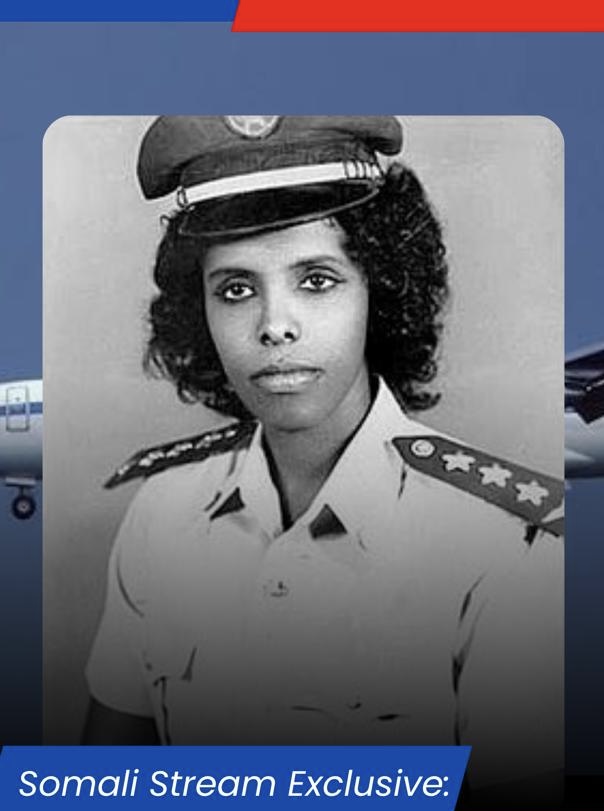Legendary Somali aviator Asli Hassan Abade, Africa’s first female pilot, has expressed her overwhelming joy and lifelong dream to once again fly for Somali Airlines following news of the national carrier’s revival after more than three decades.
Speaking to Somali Stream, Asli said the announcement that the government had acquired two Airbus A320 aircraft for Somali Airlines brought her to tears, a moment she had long dreamed of since the airline’s grounding in the early 1990s.
“It is something to be happy and proud of, something we’ve waited for ages,” Asli said. “This is the kind of news that brings hope. I’ve always expected and dreamed of this return.”
The Somali government recently confirmed plans to revive the once-iconic “White Star” airline, with Transport Minister Mohamed Farah revealing that two Airbus A320 planes had been secured, and that flights are expected to resume within two months.
Asli, who made history in 1976 as the first female Somali and African pilot, said she hopes to return to the cockpit and captain the inaugural flight, landing at Aden Abdulle International Airport, just like she did nearly five decades ago.
“If I am alive and healthy, I wish to be the first captain to fly Somali Airlines again and land one of the planes at the Aden Abdulle Internaitonal Airport. I dream that the entire crew – the captain, co-pilot, flight engineer, and hostesses will all be Somali,” she shared emotionally.
Asli celebrated her 49th aviation anniversary this year. Her journey began near the airport in Mogadishu, where, as a young girl, she was fascinated by the aircraft taking off and landing daily. In 1970, she left Somalia to study aviation in Italy, later moving to the United States, before returning home to join the Somali Air Force.
She attributes her success to the progressive support for women under Somalia’s past government, which enabled her to enter military aviation – a field dominated by men. She served for a decade before leaving Somalia once again due to conflict.
Today, Asli maintains her Federal Aviation Administration (FAA) license and continues to fly at least twice a year, in line with international aviation regulations.
A Symbol of National Pride and Unity
Reflecting on the historical significance of Somali Airlines, Asli recalled the airline’s heyday as one of Africa’s most respected carriers, with an all-Somali crew known for their skill and professionalism.
“Somali Airlines once traversed the world – with pilots, engineers, and staff among the best in Africa,” she said. “Its return represents more than flights; it is a revival of national pride and unity.”
She also emphasized the importance of rebuilding not only the airline but also national institutions, including the armed forces, navy, and air force, as part of Somalia’s broader recovery.
“The return of the airline can contribute to national security and development. I hope this revival signals the rebuilding of all our forces and institutions,” she said.
Asli expressed cautious optimism regarding the purchase of used aircraft, urging the government to prioritize safety, maintenance, and long-term investment.
“Even if we buy only one aircraft, let it be a safe one. The Airbus A320 is a strong aircraft -one of the best in the A300 family. It uses efficient engines and carries up to 180 passengers. It’s a good choice,” she noted.
A Dream for Generations
Beyond aviation, Asli touched on national unity and identity, urging Somalis to look past tribal divisions and embrace their shared heritage.
“No tribe is greater or lesser than another. We must use our diversity to identify and connect with one another – not to divide,” she said.
Somali Airlines, known for its iconic white and blue livery adorned with the five-pointed star, represented the five Somali regions and stood as a proud symbol of independence and pan-Somali identity.
“The White Star stood for our unity. We must celebrate every step of our success as a nation,” Asli concluded.
Somali Airlines was founded in 1960s and operated until 1991, when civil war led to the collapse of the central government. The airline previously offered international and domestic flights, and was widely regarded as a symbol of Somali sovereignty and professionalism in aviation.
With plans now in motion to restore the carrier, generations of Somalis, at home and abroad, are watching with hope, inspired by pioneers like Asli Hassan Abade, whose dream remains firmly fixed on the skies.


